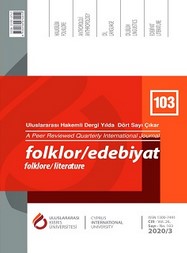Ötekinin Ötekisini Anlatan Roman: O/Hakkâri’de Bir Mevsim
Novel Depicting the Oher of the Other: O/Hakkâri’de Bir Mevsim
Author(s): Hanife Nâlân GençSubject(s): Studies of Literature, Turkish Literature
Published by: Uluslararası Kıbrıs Üniversitesi
Keywords: Ferit Edgü; Hakkâri’de bir mevsim; city; other; Hakkâri;
Summary/Abstract: One of the important representatives of minimal story and existentialist philosophy, Ferit Edgü is a writer, poet and artist who has produced many literary works. Before his literary career, the painting, ceramics and art education he received influenced him and his literary life in a different direction and gave direction at once. He studied painting at the Academy of Fine Arts in France and returned home in 1964. The writer travels to Pirkanis village of Hakkâri to fulfil his military service, where he spends the biggest change of his life. What he lives and sees in this small village return to him as a great experience. The events he witnessed and experienced here not only inspired his private and literary life, but also changed all the balances of his thought system. Hakkâri is literally a point of change in the writer’s private and literary life. This adds a new perspective to the urban style. The author, who takes the individual into his focus, combines the problem of existence with the dimension of nonconformity to describe it with a different understanding. In this respect, the primary purpose of this study is to explain the deep meaning of the author’s connection with Hakkâri, as he do not tell or explain. It is evident that this city, which gives a name to the work and inspires it even when the novel O/Hakkâri’de Bir Mevsim is considered, has left deep and lasting traces in the world of the author. The novel is the best example of how much Edgü’s pre-and post-Hakkâri works have changed. The novel is a touchstone, especially in terms of narrative structure, style and perspective, reinforced by images. The effects of this city, in which the author recreates not only himself but also his literary aspects, have been tried to be explained by descriptive content analysis. With this, it was concluded that this city was the main factor that brought the author closer to existentialism and the shrinking story genre. With this study, it was found that Edgü’s literary career was separated before and after Hakkâri. Because there are quite striking differences between the works he wrote in the pre-Hakkâri period and the ones in the following in terms of subject and style. O/Hakkâri’de Bir Mevsim has added a new perspective to his universe of thought. This determination was reached by the link between the author’s autobiography and the novel.
Journal: Folklor/Edebiyat
- Issue Year: 26/2020
- Issue No: 103
- Page Range: 451-462
- Page Count: 12
- Language: Turkish

